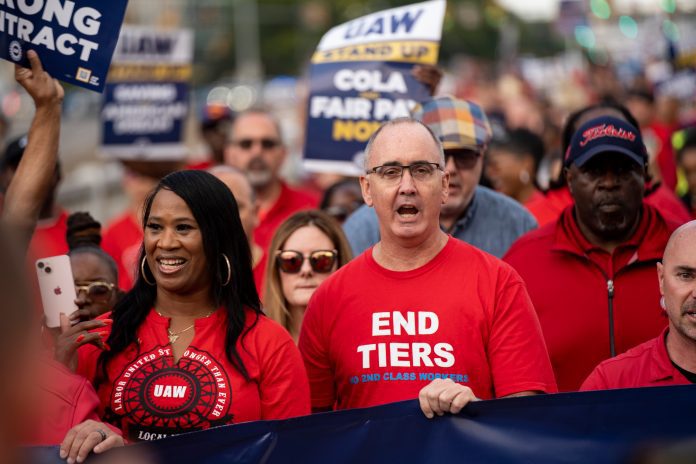In a significant blow to the United Auto Workers (UAW), workers at the Mercedes-Benz plant in Alabama have voted against joining the union. This halts the momentum the UAW had been building with recent organizing successes.
According to the National Labor Relations Board, 56% of the approximately 5,000 eligible workers voted against unionizing, with more than 90% participation in the election.
This defeat marks the first major setback for UAW President Shawn Fain, who has revitalized the 89-year-old union with a combative stance and passionate rhetoric since taking office 14 months ago. Fain acknowledged the disappointment but remained resolute, stating, “While this loss stings, these workers hold their heads high. We fight the good fight and continue forward.”
The union had been riding a wave of success, highlighted by a recent victory at a Volkswagen plant in Tennessee, where the UAW organized its first foreign automaker in the South. This followed record contracts secured from General Motors, Ford, and Stellantis after a dramatic six-week strike last year. Fain attributed changes at the Mercedes plant, including a recent wage increase, to the union’s achievements in Detroit.
Despite the loss in Alabama, the UAW remains committed to its strategy of targeting factories and facilities owned by about a dozen car companies, including BMW, Toyota, and Tesla. With a $40 million budget for organizing drives over the next two years, the UAW’s broad and coordinated campaign is a testament to its determination and long-term planning.
However, the union faces significant challenges, including skepticism from workers who recall past corruption scandals involving UAW officials. Melissa Howell, a 19-year veteran of the Mercedes plant, cited these issues and expressed doubt that unionizing was the best way to achieve desired changes like work-schedule adjustments. Howell noted the positive impact of new Mercedes U.S. CEO Federico Kochlowski, who has been engaging directly with workers.
Mercedes-Benz took a proactive approach in the lead-up to the vote, presenting to workers how the company would address their concerns and how unionization might alter the workplace dynamics. Fain accused Mercedes of employing union-busting tactics, which the company denied.
The Mercedes plant, which produced nearly 300,000 vehicles last year, is a crucial facility for the German automaker. It manufactures large and midsize SUVs as well as electric models. The UAW considers its inability to organize here a setback, but the union’s methodical approach allows it to quickly shift its focus to other targets, such as a Hyundai plant in Montgomery, Alabama, and a Toyota engine plant in Troy, Missouri.
As the UAW continues organizing efforts in the South, it can expect growing resistance from local political establishments. Alabama Governor Kay Ivey, for instance, has criticized the union’s drive, warning of potential job losses. An American University professor, Stephen Silvia, noted that the Southern economic model heavily favors non-union operations, setting the stage for ongoing conflicts between unions and local governments.




